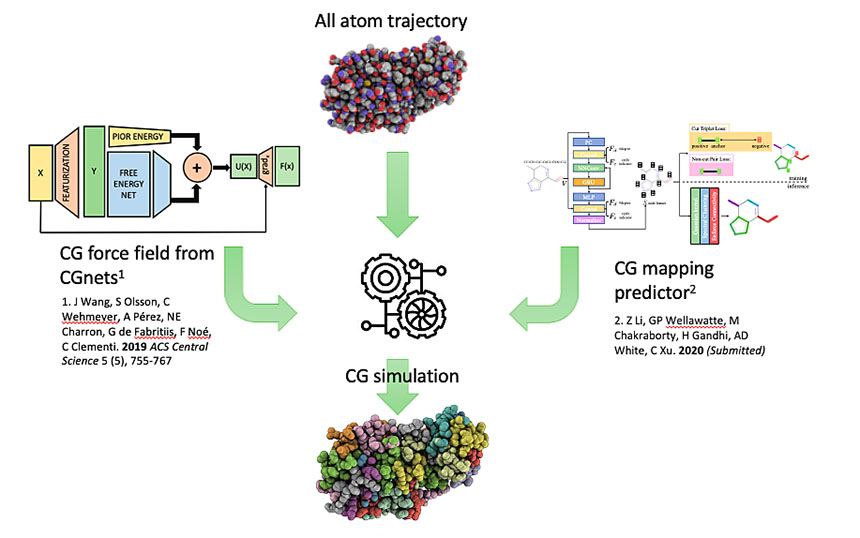Wellawatte’s simulations may aid search for COVID-19 vaccines, treatments

The complexity of the corona virus makes it difficult for researchers to simulate how potential vaccines and antibody therapies might prevent the virus’ devastating assault on human lungs, kidneys and other organs.
Available simulation methods, which study chemical reactions at the atomic level, require massive computational resources, take a long time to complete, and, even then, capture only a few nanoseconds or microseconds of a chemical interaction.
Geemi Wellawatte, a PhD student at the University of Rochester, has received a fellowship from the Molecular Sciences Software Institute (MolSSI) to apply a more coarse-grained modeling system to study the molecular dynamics of the proteins that the virus uses to bind to host cells in human tissue.
“We want to do molecular dynamics simulations to understand how drugs can affect these proteins,” Wellawatte says.
The coarse-grained modeling, developed in the lab of Andrew White, assistant professor of chemical engineering, compresses the proteins to a lower resolution structure that preserves the essential physics of the system. The modeling is combined with machine-learning software developed by another group.
Detailed simulations could greatly speed the identification and testing of potential vaccines and therapies that could disrupt the process by which the virus binds to and then penetrates human cells. The new category of six-month, special seed fellowships was created by MolSSI specifically to focus on software development, data science, workflows, and machine learning challenges relevant to COVID-19. The organization, which represents computational molecular scientists worldwide, serves as a nexus for science, education, and research across that community.
Heta Gandhi, another PhD student in the White lab, received a MolSSI fellowship in 2019.
‘Nothing but encouragement’ in Sri Lanka
Wellawatte, who received a BS in computational chemistry from the University of Colombo in Sri Lanka, says she felt “nothing but encouragement” in her country to pursue a degree in computational chemistry, despite being a woman.
“I have never experienced sexism in science at all,” she says. So, she was surprised by the continuing underrepresented of women in STEM fields in this country.
She chose to attend the University of Rochester because of its high ranking, quick response to her application, and because of the encouragement she received from Pengfei (Frank) Huo, assistant professor in the Department of Chemistry.
“His work (in quantum dynamics) is marvelous, and it was interesting,” Wellawatte says, but her heart was set more on dynamic molecular simulations.
Huo suggested she contact White, who invited her to a meeting of his research group. “Everybody presented that day because they were practicing to attend a conference and I was thinking ‘oh, my god, this is exactly what I’m looking for,’” she says. She is now in her second year with the White lab.
Like many other PhD students there are times, she concedes, when she becomes discouraged, “when I feel I can’t do this.”
However, she was inspired after hearing a lecture by Donna Strickland ’95 (PhD) who visited the University of Rochester campus in 2019 soon after sharing the Nobel Prize in Physics. Strickland described how she, too, had doubts about completing her PhD, but ultimately realized she couldn’t image herself doing anything else.
“That’s how I feel, too,” Wellawatte says.
Eventually, she would like to return to Sri Lanka, and serve as a professor of computational chemistry.
“My career may not be as good as it would be if I stayed here, because resources for research are more limited in Sri Lanka,” Wellawatte says. However, she would like expand the visibility—and the opportunity for students there to become acquainted with—the field of computational chemistry, because it will play an increasingly important role in the future.
Besides, she says, she would like to remain close to her family.
“My parents are more important to me than making money.”

